Stay in the know on all smart updates of your favorite topics.
Ruimte zoekt bevlogen, startende circulair ondernemer

Goed nieuws: er komt per 1 februari een bedrijfsruimte vrij in het Upcyclecentrum.
Voor het Upcylcecentrum in Almere zoeken we een startende ondernemer met een geweldig plan voor een onderneming dat bijdraagt aan onze lokale circulaire economie.
De afgelopen jaren is Almere uitgegroeid tot één van de koplopers van de circulaire economie in Nederland, en het Upcyclecentrum is daar een belangrijk onderdeel van. Bedrijven en overheden vanuit de hele wereld komen naar Almere om te zien hoe wij de circulaire economie vormgeven.
Het Upcyclecentrum bestaat uit drie onderdelen: recyclingperron, ondernemers en belevingscentrum. Op het recyclingperron zamelen we grondstoffen droog in. De gevestigde ondernemers in het Upcyclecentrum mogen deze gebruiken. De ondernemers laten in hun bedrijfsruimte zien wat zij doen met deze grondstoffen. Afgelopen 3 jaar hebben verschillende ondernemers zoals “Ruik”, ‘’SEEFD’’, “Unravelau” en “Ruig & Geroest” al geprofiteerd van deze kans. En er is weer plaats voor een nieuwe startup om eenzelfde ontwikkeling door te kunnen maken.
Wil jij een vliegende start maken met jouw onderneming? Of ken je zo’n ondernemer?
Stuur dan uiterlijk 30 december jouw businessplan naar ons toe via het inschrijfformulier op onze website: almere.nl/upcyclestartups.
Fellowship responsible IT for artistic researcher or artist
The Responsible IT research group at the Amsterdam University of Applied Sciences is offering a fellowship to an artistic researcher or an artist, aiming to create fresh future-oriented perspectives on digitization and public values.
For your call for proposal see the following link.
Shaping development in cities to combat climate change
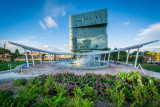
Ever wondered what life would look like in a sustainable, regenerative city?
With cities occupying only 3% of the global land surface but contributing to 70% of emissions, positive change can have a big impact. Metabolic CEO Eva Gladek reflected on how we can all become city makers. In light of COP26, it might be time to refocus on our cities.
Ready to take action? Find out how in the link below.
Pitch event | MEET THE NEXT GENERATION OF IMPACT ENTREPRENEURS

MEET THE NEXT GENERATION OF IMPACT ENTREPRENEURS
Get inspired by early-stage impact entrepreneurs during the Pitch Event of the Impact Hub Business Model Challenge #21! These ambitious entrepreneurs will share their business cases with an audience of Impact Hub members, experts and potential partners.
And you are invited! After every pitch, you can support the entrepreneurs with their next steps by giving them feedback and providing them with valuable contacts. At the end of the program you will also help to decide, together with our jury, which startup deserves a special prize!
This pitch event will be held online.
This event takes place during the Impact Hub Collaboration Day.
PROGRAM
16.00-16.10: Welcome and introduction to BMC
16.10-17.00: Listen to 9 fresh pitches, meet the entrepreneurs here!
17.00-17.15 Keynote by BMC#20 winner: Plant Based Fashion
17.15-17.30: Winner announcement
WHAT IS THE BUSINESS MODEL CHALLENGE (BMC)?
In our three-month BMC incubator, we help impact entrepreneurs unlock the potential of their innovative ideas, and turn these ideas for a better world into scalable business models!
Donut Meetup #7
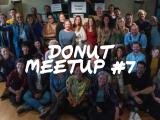
Kom naar onze laatste meetup van het jaar. Tijd om samen terug te kijken, elkaar te spreken, te verbinden en samen vooruit te kijken! We willen weten hoe het met je gaat en delen wat er allemaal gebeurt op het gebied van de donut economie binnen de community van de Amsterdam Donut Coalitie.
WANNEER 20 december, 15.30 - 17.00
WAAR online via zoom
VOOR WIE alle donut-newbies & donut changemakers van de regio Amsterdam
WAAROM de kans om elkaar te leren kennen, te verbinden, kennis te maken, elkaar te inspireren, terug te blikken en vooruit te kijken
WAT
- Samen kijken we terug wat we afgelopen jaar gezamenlijk tot stand hebben gebracht / hebben bereikt en kijken we terug naar de Amsterdam Donut Dagen en de meest belangrijkste inzichten van de twee workshops!
- Een update van donut pioniers. Met onder andere Boaz Bar-Adon van Ecodam en we geven jullie podium om zelf te delen waar je staat en wat je nodig hebt.
- De koers bepalen voor komend jaar. Wat gebeurt er in Amsterdam donut-land en hoe zie jij graag hoe de coalitie verder gaat. Dit doen we in break-outs.
- We sluiten af met het delen van de uitkomsten die we meenemen in een concreet actieplan voor komend jaar.
- Borreltijd!
Er is maar een beperkt aantal plekken beschikbaar dus wees snel met aanmelden via dit formulier.
We zien je graag op 20 december!
Team Amsterdam Donut Coalitie
Meet the members of Amsterdam Smart City! Boaz Bar-Adon: ‘Learn children about the circular economy’
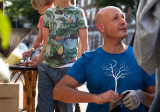
Boaz Bar-Adon is the founder of Ecodam, a startup that wants to create a place where children can actively learn about sustainability and the circular economy.
“Our big dream is a physical place where children can come to get acquainted with all aspects of sustainability—a kind of science museum, but with more focus on the concept of circularity and the role young people can play in the new economy.
It’s almost a cliche, but our children are the future. If we make them realise that we need to use resources in a different way, they will take that with them for the rest of their adult lives — no matter what profession they enter later. As a museum and exhibition designer, I see there is too little awareness among clients, designers and builders about the scarcity of materials. That should really change for future generations.''
''Recently, my associate, Pieter de Stefano, and I decided that we want to start making an impact as soon as possible. We designed a plastic-themed mobile pop-up lab. We recently gave our first successful workshop, and we plan to do it more often. In our school workshops, we give a brief explanation about circularity and the impact we have on the environment. But the most important part is when the children work on the concept of circularity. Together, we invent solutions and build prototypes. We let the children think about the problem and then let them come up with solutions themselves.”
Unstoppable
“Once it got going, the group we gave the workshop to was unstoppable. A few girls designed an entire landscape from old waste, which was a prototype of an environment where children do not throw away their old toys but collect them. Another group built a submarine to remove plastic from the sea, inspired by the Dutch nonprofit The Ocean Cleanup. The workshop ended with children creating, with specialised machines, new products from plastic waste. In the future, Ecodam could be a place where schools and universities test or show new materials or techniques. Local authorities that want to promote new policies around waste or the circular economy can also work with us. In Ecodam, they can see how children react to their policies. Maybe they will come up with new ideas.''
Permanent space
''We would like a permanent space so we can work with large machines: a shredder, for example, that cuts plastic parts into small pieces or a machine that melts them and can then press the liquid plastic into a mould. Children can create new building materials with these machines, making technology something very tangible and rewarding.
I'd love to hear of any tips people may have for a permanent space. We are a social enterprise, still investigating which business model works best for us. We will probably be partly supported by subsidies, but we are also looking for fresh ideas for smart new financing methods. How can social value be translated into financial value? Our final goal is being able to facilitate as many visitors as possible and provide them with a meaningful and high-quality experience.”
If you’d like to get in touch with Boaz, you can find him on this platform.
This interview is part of the series 'Meet the Members of Amsterdam Smart City'. In the next weeks we will introduce more members of this community to you. Would you like show up in the series? Drop us a message!
Interview and article by Mirjam Streefkerk
Meet the members of Amsterdam Smart City! Anne-Ro Klevant Groen: ‘It’s very rewarding to work on a solution with Fashion for Good’
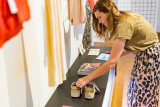
Anne-Ro Klevant Groen is Marketing and Communications Director at Fashion for Good, a platform that connects established fashion brands with startups.
“Ever since I was a little girl, fashion has been my passion. But I also know that the fashion industry has a large, negative impact on people and our environment. We need to transform our current take-make-waste model into a circular fashion system. For me, it is very rewarding to work on solutions via Fashion for Good.
We connect sustainable and innovative startups to corporate fashion companies and manufacturers such as Adidas and C&A. Many startups have fantastic ideas for more sustainable fashion, but they don’t yet have the network or financial resources to connect with large companies. Others want to know more about intellectual property or marketing. Our mentors help these startups with tailor-made programs based on their maturity.
Corporations invest in us to help us do our jobs, but they also dedicate teams and time to our programmes. We help them with impact assessments so they can see where they will be most effective, and then we connect them to the startups that fit their goals. C&A, for example, was part of a pilot that used blockchain technology to improve transparency in the organic cotton industry. The technology helps trace the origin of organic cotton, similar to what is already being done with coffee and cocoa. Tommy Hilfiger has collaborated with a startup that makes vegan leather from the pectin in apples. We are also starting our own foundational pilot projects, including one with chemical recycling and another that’s working on developing circular polybags for clothes, such as the bags that are wrapped around our clothing when we order from webshops.”
The Amsterdam ecosystem
“Amsterdam offers us plenty of opportunities. It is a very creative city and home to many of the large fashion house’s headquarters. There’s also a good startup and investment climate. We have a co-working space in the heart of Amsterdam for innovative, sustainable fashion startups and freelancers. It’s a large open space where individuals or companies can rent desks and connect to other members of the Dutch circular fashion ecosystem. We always have some space available, so feel free to contact us if you want to be part of our network.
We are also working on an education program for MBO schools to ensure that the fashion industry’s future workforce understands the need to get rid of that take-make-waste model.
For consumers, we have the Fashion for Good Museum on the Rokin in Amsterdam, where we want to educate visitors so they can make better fashion choices. The museum industry is still fairly new to us, and we would like to get in touch with parties that can help us reach more people. Ultimately, it is consumers who either have to buy less or get to know more about the sustainable apparel our partners are developing, make better decisions and demand a better product.
We publish what we learn about sustainable clothing and textiles in our website’s Resource Library. It’s accessible to everyone—free of charge—so startups don’t have to waste valuable time reinventing the wheel. By working together better, we work more efficiently and can accelerate our transformation to a circular fashion system.”
If you’d like to get in touch with Anne-Ro, you can find her on this platform.
This interview is part of the series 'Meet the Members of Amsterdam Smart City'. In the next weeks we will introduce more members of this community to you. Would you like show up in the series? Drop us a message!
Interview and article by Mirjam Streefkerk
Barcelona and Madrid: Forerunners in e-governance

Barcelona is one of the oldest examples of a city that deploys technology as part of its government. Sensor networks have been producing an array of data on transport, energy usage, noise levels, irrigation, and many other topics without having much impact on the life of citizens or solving the underlying problems.
In 2015, Francesca Bria, chief technology, together with mayor Ada Colau started to reverse the smart city paradigm: Instead of starting from technology and extracting all the data we started aligning the tech agenda with the agenda of the city, she said.
One of the first challenges was using technology to increase ordinary citizen’s impact on policy. A group of civic-minded coders and cryptographers created a brand-new participatory platform, Decidem (which means We Decide in Catalan). For more information watch the video below.
Spain offers more inspiring examples. The city of Madrid has also created a participatory citizen platform, not for chance called Decide Madrid, which is in many respects comparable with Decidem, as this short video demonstrates.
The most important features of both platforms are:
Active participation in policy making
Citizens are stimulated to suggest ideas, debating them, and vote. In Barcelona, more than 40.000 citizens have suggested proposals, which form 70% of the agenda of the city administration. The most frequently mentioned concerns are affordable housing, clean energy, air quality and the public space.
The Municipal Action Plan of Barcelona includes almost 7,000 proposals from citizens. Decidem enables citizens to monitor the state of implementation of each of them to increase citizen’s engagement.
Debating
Decide Madrid and Decidem emphasize the value of being informed as starting point for deliberation. Citizens can start discussions on their own and participate in threaded discussions started by others.
As soon as citizens feel informed and have exchanged opinions voting can start. Both Decide Madrid as Decidemhave a space where citizens can make proposals and seeks support. Proposals that reach enough support are prepared for voting. These votes generally are advising the city council.
Policy preparation
Decide Madrid enables citizens amendment legislative texts. The public is allowed to commend any part of it and to suggest alternatives. This also might result in discussions and the suggestions are used to improve the formulations.
Data governance
Decidem and Decide Madrid are also data portals that show data that have been collected in the city, partly on citizens themselves. Decidem has the intention, because of its participation in the European project Decode to enable citizens to control the use of data of their own for specific purposes.
Hybrid solutions
As not every citizen has a computer or is skilled to use the Internet platforms, both cities combine virtual discussions and discussion in a physical space.
It is not only the traditional rivalry between Barcelona and Madrid that has inspired the development of two comparable systems, independently from each other. It is also the fact that the Spanish people had to fight for democracy until rather recently. Democratic institutions that have long existed in many other countries had to be reinvented, but with a 20th-century twist.
The community of Madrid has developed Decide Madrid together with CONSUL, a Madrid-based company. CONSUL enables cities to develop citizen participation on the Internet quickly and save. The package is very comprehensive. The software and its use are free. CONSUL can be adjusted by each organization to meet its own needs. As a result, Consul is in use in 130 cities and organizations in 33 countries (see the map above) and reaches out around 90 million citizens worldwide.
In contrast with e-Estonia, the topic of a former post, the footing of Decidem and Decide Madrid is enabling citizens to make their voice heard and to participate in decision-making. Both cities offer excellent examples of e-governance. e-Governance reflects the mutual communication between municipal authorities and citizens using digital tools to align decision making with the needs and wants of citizens. Instead, the intention of e-Estonia is to improve the efficiency of the operation of the state. Both aims are complementary.
I will regularly share ‘snapshots’ of the challenge of bringing socially and ecologically sustainable cities closer using technology if useful. These posts represent findings, updates, and additions to my e-book Humane cities. Always humane. Smart if helpful. The English version of this book can be downloaded for free below.
Fashion for Good Clothes Swap
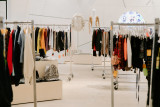
The Fashion for Good Clothes Swap is making its comeback On the 30th of September 2021 at the Fashion for Good Museum in Amsterdam!
On the 30th of September 2021, Fashion for Good is organising a Clothes Swap at the Fashion for Good Museum. An easy and fun way to refresh your wardrobe with new (second hand) items and also a perfect way of giving your unworn items a new home. Good for you, the planet and your wallet!
Want to join?
Do you have any clothes you’re not wearing anymore? Those items that have been stuck in the back of your wardrobe for ages and never make the cut? Perfect clothing pieces to swap!
Collect your items and hand them in at the Fashion for Good Museum (Rokin 102, Amsterdam) until September 29 (daily between 11 am - 5 pm, please note: the museum is not open on Tuesdays!). You will receive special tokens for the items you bring in, which you can then use on September 30th, during the Clothes Swap, to “buy” your new items.
Clothes Swap rules:
We categorise the clothes using a token system. For every item you hand in, you'll receive either a yellow token worth 1 point (for fast fashion items or similar), a red token worth 2 points (for mid-end brands) or a blue token worth 3 points (for high-end brands). You can then use your tokens to "buy" items of equivalent points. For example, you could exchange 3 yellow tokens for 3 "yellow" items or for one "red" item because each is worth 3 points.
- You can hand in a maximum of 5 items per person
- Underwear and swimwear are not accepted
- Clothes must be clean and washed
- Torn or worn out clothing will not be accepted
Extra fun!
During this edition you can also swap with our close friends of the museum and Dutch (sustainable) influencers Milou Turpijn, Sara Dubbeldam (When Sara Smiles) Lisa Stel (Lisa Goes Vegan) and Stephanie van den Sigtenhorst (Let's Talk Slow)! They will hand in a few of their unused gems, which can end up in your closet. Keep an eye on our social media for a sneak peek!
Ticket price: €5
Be quick! There is a limited amount of tickets available
We would like to notify you that all attendees will require a Corona access certificate through a vaccination certificate, proof of recovery or a negative test.
To enter the event you will need to have 1 of these 3:
- Vaccination certificate (2 doses + 14 days)
- Proof of recovery: proof of positive test at least 11 days ago up to 180 days
- Test certificate: negative results from less than 24h before the event
Please don't forget to bring your ID card.
Want to become part of the Good Fashion Movement and contribute to a more sustainable fashion industry, visit the world's first museum for sustainable fashion innovation at the Rokin 102 in Amsterdam to learn what you can do to contribute or keep an eye on our calendar for more sustainable fashion related events!
Demoday Circular City x Mobility
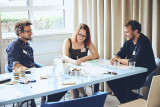
Demodays are part of our innovation process and intended to boost the progress of the various innovation projects, put requests for help on the table, share dilemmas and involve others in your projects or challenges. We host them every 8-10 weeks.
Invitations are sent but we're always open to adding a few new names to the list.
During Demo days, community members pitch projects and ask for input. In small groups we work on concrete questions. We organize workshops with our partners to get a step further in the process. All in a very positive, open and cheerful vibe.
This time on the agenda:
Pitches:
Electric charging service hub – Beelen Mobility
There are more and more electric cars that also need to be charged. This growth cannot be fully accommodated with charging hubs in streets. De Beelengroep is developing a charging hub, a place where you can charge your car, and do other useful or fun things in the meantime. These hubs are well integrated into the energy system and do not place a greater burden on the grid. How do we make this even better?
A smart city, that's how you do it - Future City Foundation
Digitization and technology will fundamentally change our cities, regions and villages in the coming years. But what instruments do we need to make this happen in the best possible way? In the City Deal 'A smart city, that's how you do it' we develop, test and implement these instruments.
From Waste to Harvest – De Gezonde Stad
In Amsterdam we throw away organic waste together with household waste. The 'From Waste to Harvest' project takes a concrete step towards a circular and healthy city. More than 100 people have registered and deliver their organic waste to the neighborhood garden, which is used to make valuable compost. De Gezonde Stad tells how to involve people and let them experience the value of their 'waste'.
Workshops:
Robots and a liveable city – TU Delft / AMS Institute
In the near future, robots will most likely take to the streets to do their jobs. Think of robots that deliver groceries or medicines, or robots that support in keeping the city clean and pleasant. How can we design these robots in such a way that they can share public space with us in a harmonious way?
Supply of catering, by water – City of Amsterdam
For 20 years, efforts have been made to increase transport by water. There is still a lot of logistics space here. It can therefore relieve the road, and water transport can also be clean. Technology is available, but there is no business case yet.
Shared mobility – solution or annoyance?
We keep seeing forms of shared mobility; cars, scooters and cargo bikes. A nice development. But in many cities it also leads to problems. How do we ensure that we actually use these new forms of mobility to reduce problems, emissions and use of raw materials?
Want to join? Have a question? Let’s hear it in the comments!
Donut Meet & Greet
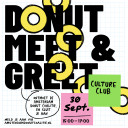
Always wanted to meet Kate Raworth in an intimate setting and exchange stories with other local & global donut fans?
Then this is your chance!
On Thursday, September 30, 15.00 - 17.00 CET, the Donut Meet & Greet Event will take place during the Amsterdam Doughnut Days at the new AHK Culture Club!
What you can expect:
- international (live) video messages from Spain, Barbados, Frankfurt, Copenhague and beyond
- informal talk about DEAL from the DEAL team itself
- inspiring donut examples from the community and opportunities for you to join
- sneak peek into the results of the donut events from the previous days
- enough time for us to share and connect experiences
- drinks at Clubhouse to network and celebrate
Due to popular demand are all seats are taken. If there are any cancellations, you can score a seat by filling out this form.
Take a virtual tour of eco-hub de Ceuvel

At de Ceuvel we host private tours for interested individuals, schools, companies and other parties. Whether you’re an architect, technical engineer, a high school student, or just a generally interested person: there will be someone at de Ceuvel that can explain our story in a way that’s relevant to your background.
The tour covers the story of De Ceuvel. You will learn about sustainability & the circular economy, urban renewal strategies, architecture and communal experimentation and bottom-up development.
Our virtual tour of de Ceuvel was developed during the corona lockdown. Instead of physically visiting our site, we can show you around virtually! The online tour, or webinar, is conducted in a Zoom meeting. Our guide welcomes you in this virtual environment at a time and date of your convenience. Using photos, exclusive videos and illustrations unavailable elsewhere, we tell the story of our unique site. There will be ample time for questions and conversations with the live tour guide.
The virtual tour can be given to a large group of Zoom participants, or as a remote speaker during a physical event. It is suitable in various contexts: as a guest lecture for schools or universities, as a program item of an (online) sustainability conference, as part of a more extensive (company) training course, or in whatever setting you've designed.
Wat vind jij? Verdient serious gaming een stevigere plek in het aanpakken van transities?
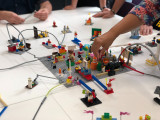
Serious gaming is een mooi hulpmiddel voor samenwerking en
besluitvorming in de energietransitie. In de afgelopen jaren hebben we
voorbeelden gezien van spellen die complexe vragen begrijpelijk kunnen maken. Neem bijvoorbeeld de HEAT tool van Alliander, het WE-Energy spel van de Hanzehogeschool Groningen, de sustainability DNA game van de Ceuvel, het Klimaatspel Plan Zuid van de Gemeente Amsterdam en het participatiespel van de Hogeschool van Amsterdam. Stuk voor stuk interessante serious games die ingewikkelde processen van verduurzamingsopgaven eenvoudiger maken.
De Hogeschool van Amsterdam en Amsterdam Smart City zoeken samen hoe we de meerwaarde van serious gaming voor energieprojecten kunnen verhogen. Enerzijds omdat we ons afvragen of de potentie wel volledig wordt benut. Anderzijds omdat opvalt dat structurele toepassing, of op grotere schaal, uitblijft. De zoektocht staat nog ver aan het begin, maar we gaan graag met anderen hierover in gesprek. En daarom vragen we jou om met ons mee te denken.
Voor wie zijn serious games?
Serious games zijn er genoeg, maar ze verschillen in de inhoudelijke focus, schaalniveau en doelgroep. Sommigen gaan uitsluitend over energie, anderen ook om andere aspecten van gebiedsontwikkeling. Daarbinnen kan het gaan over een hele regio of een bepaalde buurt. Omdat de energietransitie gaat om multistakeholder samenwerking, hebben meerdere doelgroepen baat bij het spelen van een serious game over dit onderwerp. Denk aan beleidsmakers en (nuts)bedrijven, die bijvoorbeeld moeten samenwerken om een warmtenet te realiseren.
Een doelgroep die hier niet kan ontbreken is natuurlijk de bewoner. Voor hen lijkt de toegevoegde waarde van serious games nog wel het grootst. Juist vanwege de laagdrempeligheid van een serious game is het bij uitstek een middel om mensen te helpen complexe informatie te begrijpen. Hoe meer je speelt, hoe beter je het begrijpt. En het begrijpen van een onderwerp is een belangrijke voorwaarde om mee te kunnen denken, praten en besluiten over een onderwerp. Een belangrijke reden om dit soort spellen extra serieus te nemen. Bovendien biedt een spel de mogelijkheid om gelijkwaardig met elkaar in gesprek te gaan. Verschillen in sociaaleconomische status zijn eigenlijk niet van belang. Sterker nog, spellen bieden juist gelegenheid om in elkaars schoenen te staan. Het helpt om elkaars perspectieven te begrijpen, of je nu bij de gemeente werkt, bij een netbeheerder, een woningcorporatie, of je huurder bent of woningeigenaar. Zo zijn er nog wel meer voordelen te benoemen. Voordelen die ook kunnen gelden voor andere transities dan de energietransitie.
Kansen
In de praktijk lijken we deze voordelen niet voldoende te benutten. Serious gaming voor de energietransitie is weliswaar op verschillende plekken ontwikkeld, maar in beperkte mate, en niet structureel toegepast. Daar komt bij dat we er ook weinig van weten. Welke spelmechanismes werken en welke niet? Wanneer zet je zo’n spel het beste in? Bij het ophalen van ideeën, de daadwerkelijke besluitvorming, of ook in de evaluatie? Zijn er eigenlijk ook risico’s? Zijn er redenen om serious gaming absoluut niet te willen gebruiken in het energieneutraal maken van wijken?
En dan nu de vraag aan jou!
Om de zoektocht kracht bij te zetten vraag ik namens Amsterdam Smart City onze community om hulp. Hoe kijk jij aan tegen serious gaming als middel om te werken aan transitieopgaven? Zie je de toegevoegde waarde van zo’n game voor buurtparticipatie? En van welke voorbeelden zouden we moeten leren – of wellicht als netwerk moeten door ontwikkelen?
We zijn benieuwd naar je ervaringen! Laat je reactie achter in de comments!
Amsterdam doughnut days 28 sept -1-okt
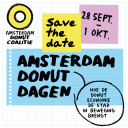
Amsterdam must and can transit into the doughnut much faster. That is why we organize the Amsterdam Donut Days. Four days full of meetings and workshops to find out together with Kate Raworth how we can create breakthroughs. So mark September 28 to October 1, 2021 in your agenda for the Amsterdam Doughnut Days!
- Donut Design Workshop, WDCD and Tolhuistuin
28 Sept. 09.00 - 13.00
- Workshop Powers to Act, Pakhuis de Zwijger
29 Sept. 09.00 - 18.00
- ADC Community Event, Culture Club
30 Sept. 15.00 - 17.00
- The Big Donut Showcase, Pakhuis de Zwijger
30 Sept. 20.00-22.00
- Center for Economic Transformation, AUAS
1 Oct. 9.30 - 13.00
A week full of donut events at various locations in Amsterdam. Go where the energy is: save the date and keep an eye on our event page for more info.
The Amsterdam Donut Days is an initiative of the Amsterdam Donut Coalition, in collaboration with the Amsterdam University of the Arts (AHK), Culture Club, the Donut Economics Action Lab (DEAL), Amsterdam University of Applied Sciences (AUAS), Pakhuis de Zwijger, Tolhuistuin , What Design Can Do (WDCD) and YesAndMore.
Note from ASC: Have a question? Let’s hear it in the comments.
Doughnut community event with kate raworth
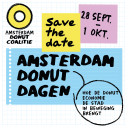
Always wanted to meet Kate Raworth in an intimate setting and exchange stories with other donut fans? Looking for inspiration for a new kickstart of the year? Then this is your chance!
On Thursday, September 30, 15.00 - 17.00, the annual Amsterdam Donut Coalition Community Event will take place during the Amsterdam Donut Days at the new Culture Club! We can't wait to determine the new course together with you and join forces to get Amsterdam into the donut.
Sign up
Enough time to network and share stories with a snack and a drink.Sign up via the link below and find more info on our website: https://bit.ly/3ir0kWJThere is only a limited number of places available.
Note from ASC: Have a question? Let’s hear it in the comments.
Open call powers to act workshop with kate raworth
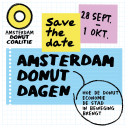
We need each other to get into the 'doughnut'. Transforming a city only succeeds if all stakeholders have one goal and work together. So: how do we get to a joint agenda and approach?
On September 29th from 09.00 - 18.00 we are organising a Powers to Act Workshop led by none other than Kate Raworth, the creator of Doughnut Economics.
Looking for 30 participants
We are looking for thirty participants; highly motivated, from all stakeholder groups, doers/thinkers, and diverse in all ways. Are you up for helping the city turn into a doughnut city? Then let us know via the form why we should not miss you!
This event is part of the Amsterdam Doughnut Days 28 september - 1 oktober. More info on https://bit.ly/3eBVAwB
Note from ASC: Have a question? Let’s hear it in the comments.
Vacature Online Contentspecialist

Eet jij content als ontbijt, lunch en diner? Weet je hoe je het netwerk van de Amsterdam Economic Board kunt aanspreken en activeren? Schrijf je sterke social posts in foutloos Nederlands en beheers je de Engelse taal op een goed niveau? Heeft Google Analytics geen geheimen voor je en maak je graag deel uit van een enthousiast en betrokken communicatieteam?
De Board heeft een vacature voor een krachtige Online Contentspecialist per september voor 32 uur per week. Reageer voor 30 juli en we gaan graag met je in gesprek.
Note van ASC: Wil je net iets meer weten? Laat het Jet weten in de comments.
Gezocht: Stagiair(e) strategie-team

Vanaf september 2021 hebben wij een stageplek voor een initiatiefrijke, meewerkende stagiair(e). Heb jij zin in een stage binnen het strategie-team waar je verschillende partijen leert kennen en je onderzoek doet naar innovatie voor een slimme, groene en gezonde toekomst van de Metropool Amsterdam? Dan zoeken we jou!
Het strategie-team van de Amsterdam Economic Board doet onderzoek naar drie maatschappelijke transities in de regio: Energie, Circulair en Digitaal. We werken met toekomstscenario’s en organiseren kennissessies om het gesprek over de toekomst van de economie te voeren met ons netwerk. Daarnaast verbinden we kennisinstellingen, overheden en bedrijven in de regio op strategisch niveau en stimuleren we innovatieve samenwerking tussen hen.
Klinkt dat als een uitdaging die jou goed ligt: Lees dan alles over deze stage-vacature.
Van Afval naar Oogst
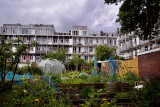
We gooien in Amsterdam nog steeds ons gft-afval bij het huishoudelijke afval. Zonde vinden wij! Van dit gft-afval kan namelijk goede compost gemaakt worden. Daarom zijn we in mei 2020 samen met Stichting Onschatbare Waarde van start gegaan met het project Van Afval naar Oogst.
De centrale locatie van het project is in de buurttuin van I Can Change The World With My Two Hands, een initiatief van Onschatbare Waarde, in Amsterdam West. Onze gezamenlijke ambitie was 100 Amsterdammers te betrekken bij afvalscheiding en hergebruik. Meer dan 100 mensen hebben zich aangemeld en leveren nu wekelijks hun gf-afval in bij de buurttuin waar waardevolle compost van wordt gemaakt.
De Gezonde Stad werkt aan een groene, circulaire en inclusieve stad, niet door er lang over te praten, maar door te doen, samen met een community van bewoners, bedrijven, overheden en andere organisaties. We planten bomen, leggen buurtparken en moestuinen aan, we organiseren events om lokaal voedsel op de kaart te zetten, we zijn trekker van het platform Van Amsterdamse Bodem en we sluiten kringlopen, zodat afval weer tot iets waardevols kan worden omgezet.
Volg ons op social media of check degezondestad.org om op de hoogte te blijven.
PODCAST Groen & Gezond Almere: Jim van der Wardt over ondernemen, verbinden en Makers van Almere
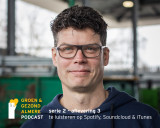
In deze aflevering spreekt presentatrice Nadia Zerouali Almeerder Jim van der Wardt. Hij zag een kans om een beweging in de stad die al bestond, maar nog niet zichtbaar was, een podium te geven. Onder de noemer Makers van Almere bracht hij de makers in de stad digitaal samen én bij de mensen thuis.
Zelf is hij ook een ondernemende maker in de stad en brengt met zijn duurzame uitgangspunt een oude ambacht weer tot leven. Hoe hij dit allemaal doet, ontdekken we in deze aflevering. Hij is te luisteren op Spotify, Apple Podcasts & Soundcloud!
Ben je nieuwsgierig naar wat er verder allemaal gebeurd op het gebied van duurzaamheid in Almere? Je kunt het duurzaamheidsprogramma van de gemeente Almere volgen via groenengezond.almere.nl of via Instagram, Facebook, Twitter en LinkedIn onder Groen en Gezond Almere.
Heb je nog ideeën voor deze podcast, een tip of iets aardigs? We horen heel graag van je. Laat een reactie achter via je favoriete podcast app of in de comments.
Stay up to date
Get notified about new updates, opportunities or events that match your interests.

